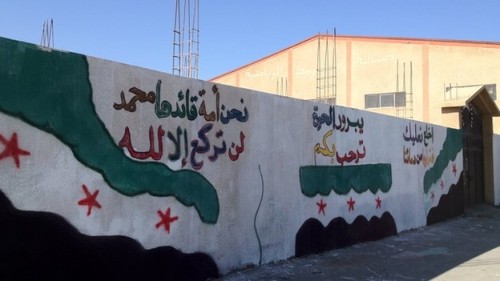PHOTO: A wall in Yabroud “Take off your shoes as Yabroud’s sand is our blood”
Ten days ago, Syrian regime force captured Yabroud, the largest city in the Qalamoun region between Damascus and the Lebanese border. Many of the 60,000 residents had fled amid weeks of bombardment.
In an article from December 2012, reposted by EA from the BBC, a resident of Yabroud describes life in the city under opposition local councils:
I personally consider Yabroud to be an area free of government control. We have not seen government forces inside the city for almost a year now.
Bashar al-Assad’s forces attempted to enter the city six months ago but the Free Syrian Army (FSA) held them back on the same day.
Government forces have since retreated to the edges of Yabroud and their efforts have been reduced to the regular air strikes they carry out once in a while. They seem to have given up. Perhaps we are not as strategic as other areas.
We have not suffered a lot compared to other cities in Syria. Total casualties here, over the past 18 months, are only around 40-50 people.
The city is currently run by two councils. One is military and is mainly concerned with holding back the regime’s forces. The other is a civilian one and is responsible for securing health care and food supplies for residents.
If it were not for the air strikes, I would have said we live like people in any other normal city. There’s no shortage of food here, for instance.
But prices have increased dramatically, especially fuel. A litre that used to cost 25 US cents two years ago now costs $1.20 (£0.75).
The rate of the air strikes has increased recently and this is making people nervous.
One strike was near my home but, fortunately, there were no casualties. People have got used to them now and so only occupy the bottom floors of buildings.
Apart from the air strikes, it is relatively safe here. The police on the streets have been replaced by a brigade that is attached to the military council. There are no curfews but most people stay indoors after 22:00.
Sometimes the electricity can be cut off for around four hours. Most people here are what we used to call the middle classes before the revolution and many of them can still afford to buy generators and the necessary fuel.
It is the same story with the internet and phone lines. It is a matter of luck when either of them is working. I consider myself lucky whenever I get the chance to speak to my brother who lives abroad.
But despite all the hardships people try to lead a normal life and support each other. We have Christians and Muslims living here. Yabroud is a historical city, in fact, it the home of the oldest church in Syria.
Christians in the city are about to celebrate Christmas. Although it is not the happy occasion it used to be and there won’t be any decorations on the streets, we still make sure we celebrate it with them and send each other greetings.
Christians make up around a quarter of this city’s population and any talk of sectarianism is far from the truth. It is the kind of warnings the regime like to propagate for its own advantage.
Yabroud’s normal population is around 60,000 but we now have about 20,000 refugees from Homs and other areas living with us in the city. Their needs are well looked after by residents and the civilian ruling council.
I take my kids to school which is not far from our house. I am a writer by profession and try to supplement my work through a small business I run while my wife works in a hospital.
A lot of people I know left a long time ago. I have thought seriously once or twice, when things got tough, about whether to leave the country or not.
I am in my late forties and I come from a generation that was brought up on empty slogans about revolutions and freedom. But I choose now to stay in the country and live it for real. The last thing I would want to be right now is a Syrian activist based abroad. I would rather write and speak my mind inside my country.
You can say it is a country within a country, which explains the increasing use of air strikes by the regime. The regime is clearly not happy and does not want other areas to follow suit.
I think more areas will soon no longer be in government control much like Yabroud and Aleppo in the north. It is a matter of time, in my view.
People will naturally need governing bodies to keep the cities going and local governing councils will emerge out of necessity more than anything to fill the security and economic vacuum the regime leaves behind.
I just hope that when Assad goes, we do not become again a victim of international jostling as neighbouring and Western countries vie for positions to secure their interests in the country and the region.
I think Syrians should be left alone to shape the future of their country.

